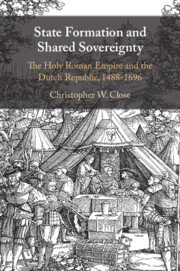Refine search
Actions for selected content:
3 results

State Formation and Shared Sovereignty
- The Holy Roman Empire and the Dutch Republic, 1488–1696
-
- Published online:
- 02 March 2021
- Print publication:
- 25 February 2021
8 - Westphalia and Politics of Alliance in the Empire and the Dutch Republic (1631–1696)
-
- Book:
- State Formation and Shared Sovereignty
- Published online:
- 02 March 2021
- Print publication:
- 25 February 2021, pp 287-328
-
- Chapter
- Export citation
5 - Shared Sovereignty and Multi-confessionality in the Empire and the Low Countries (1566–1609)
-
- Book:
- State Formation and Shared Sovereignty
- Published online:
- 02 March 2021
- Print publication:
- 25 February 2021, pp 168-208
-
- Chapter
- Export citation
